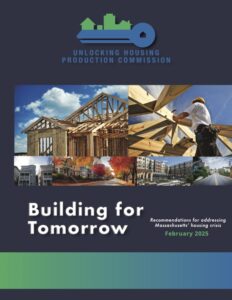Who is a member?
Our members are the local governments of Massachusetts and their elected and appointed leadership.
 A special commission today shared a report with the governor that offers more than 50 recommendations to increase the supply of housing across Massachusetts.
A special commission today shared a report with the governor that offers more than 50 recommendations to increase the supply of housing across Massachusetts.
The Commission on Unlocking Housing Production, established in January 2024, was tasked with examining how state and local laws, regulations and practices could be revised to increase the supply of housing, and to provide recommendations to the administration on potential reforms to promote housing production to meet growing demand.
The commission’s report, “Building for Tomorrow,” offers recommendations across four broad themes:
• Economic incentives and workforce development in the housing industry
• Updating land use and zoning practices
• Streamlining regulations, codes and local permitting
• Bolstering state planning and local coordination
“We need to take a close look at every idea when it comes to bringing down the cost of housing for Massachusetts residents,” said Housing and Livable Communities Secretary Ed Augustus. “The crisis we find ourselves in today was decades in the making, but with the right strategies in place, we can change that trajectory.”
Among the commission’s recommendations are the statewide preemption of single-family-only zoning — allowing two-unit buildings on any residential lot in the state and up to four units in areas served by municipal water and sewer — and the elimination of minimum parking requirements for new housing projects.
The 16-member commission, chaired by Augustus and primarily composed of housing advocates, included one local official, Easthampton Mayor Nicole LaChapelle, though others engaged during a number of stakeholder sessions.
The commission’s report is not in the form of legislation, and it remains to be seen what recommendations the administration will pursue. The MMA would have significant concerns about many of the proposals, and looks forward to working with the administration on this issue.
The Commission on Unlocking Housing Production’s report follows the Feb. 6 release of the state’s first comprehensive statewide housing plan, “A Home for Everyone,” which identifies the need for an additional 222,000 housing units in order to end the housing crisis in Massachusetts, discusses challenges contributing to the housing crisis on both a statewide and regional level, and offers strategies to make housing affordable for everyone. The administration plans to launch an online version of the state housing report, with additional tools for communities, this spring.
Among efforts to address housing costs, the state housing plan and the housing production report join recent initiatives such as the Affordable Homes Act, which authorized $5 billion in spending and nearly 50 policy initiatives, the MBTA Communities Law, and increases to tax credit programs that produce housing.